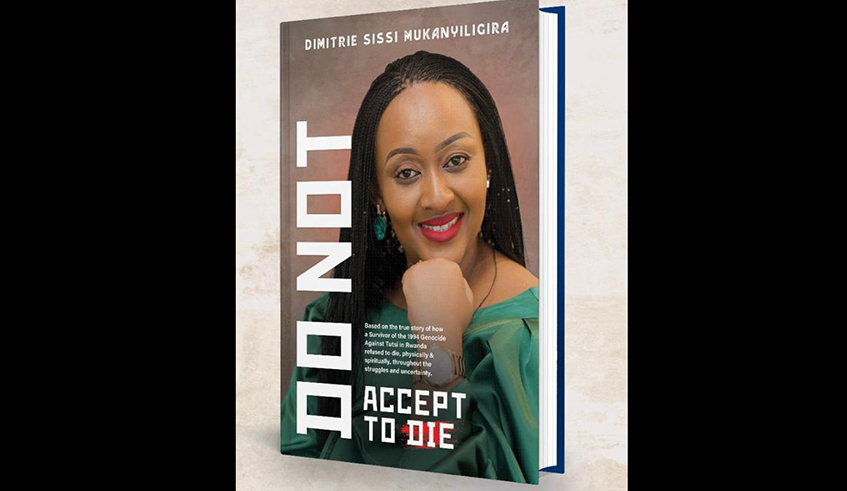

ON MAY 28, I will officially launch memoirs of my experience during the 1994 genocide against the Tutsi, a time when I, like many other Tutsi in Rwanda, waited our time to be killed.
During the period of the genocide, many of us had already come to terms with the fact that death was inevitable; the only thing we wondered about was how we would be killed. Would it be quick, would it be torture first and then be killed or would it be death by starvation?
I spent a lot of time inside the formerly-named Centre Hospitalier de Kigali (CHK) where from being put on display to be mocked by all, I was handed over as a gift to be used by one military doctor for pleasure, then dumped among the dead where they said I belonged, and so much more as I recount in my book.
It was during this that I first started to have the feeling or what I later call a voice that silently asked me to not give up on life "Do not Accept to Die”.
None of the over a million victims of the 1994 genocide against the Tutsi chose death, they were sentenced to it arbitrarily and indiscriminately by the government and officials who had sworn to protect them.
Thus, the voice inside my head, I later would understand, had nothing to do with my rejecting to die but rather an inner reminder that as long as there was breathe in my lungs, I had to hold onto every little hope and make every effort to see the next minute and hour. Hoping to see the next day would be more than wishful thinking during those dark 100 days.
It was after the genocide had ended and I had begun to find and try to stitch together broken pieces of my life and as we mourned and buried the loved ones we had been able to find, that the essence of this deep feeling to "not accept to die” became clearer.
For many survivors of the genocide against the Tutsi, life after the genocide had very little meaning. We had lost loved ones and lost dreams and aspirations. We had been robbed of our human dignity, hunted like wild game yet after this madness had been brought to an end, here we were struggling yet again to find everything, with so little hope to hold onto.
I lived the first few years after the genocide in denial, oftentimes choosing to tell those who asked about my past that I was one of the returning Rwandans. Some days I would say I returned from Zaire; on other occasions I had come home from Burundi. I refused to face the reality of what had happened and unknowingly, the death that I had physically survived was creeping inside to kill me from within.
This was the dilemma for many survivors; an inner death to the world, failing to find meaning in the new identity that we now carried, with its heavy responsibilities of preserving the past and forgiving the killers of our loved ones so that our motherland would be reborn.
After I had reconnected with my fiancé, we decided to get married and it was this decision and the children I gave birth to who truly called me out once again and the call became clearer "Do not Accept to Die”.
Even though we had experienced the worst possible, understanding that living half-heartedly and in misery would be a pleasure to those who had sought to annihilate us, the best choice to honour the loved ones I lost and the country I had regained was to live with the attitude that does not accept inner death. This became my resolve and the call I make today to Rwanda’s young and old.
Our country has come through very tough times but we are grateful that with the good leadership that liberated us and has set us on an ambitious journey; we must make a strong choice to never accept death in any area of our lives. Everyone must make effort to resurrect whatever is dying within them, knowing well that the future of Rwanda depends on it.
It took me so many years to be able to look back within me and recount the nightmares that haunted me but I finally did. I decided that while these were painful memories, it was possible that through them, I would raise my voice beyond the sorrow and call out to Rwanda’s current youth and future to draw from our history the ethos of resilience and love for country and face whatever lies ahead with conviction and determination.
I wish to conclude with a quote from our beloved President Paul Kagame in a speech he delivered to members of AERG on November 26th 2012 in Nkumba that speaks strongly to why we must not Accept to Die”.
"While ours is a bad story, we don’t accept absurdity and ridicule. The most important thing is to refuse to be prisoners of our sad history; the rest will click in place. We cannot accept to die twice; we have to pick our pieces and build our lives. This we can’t learn from any books”.
The writer is the author of "Do not accept to die” a book that chronicles her story of surviving to the 1994 Genocide against the Tutsi
The views expressed in this article are of the author.

